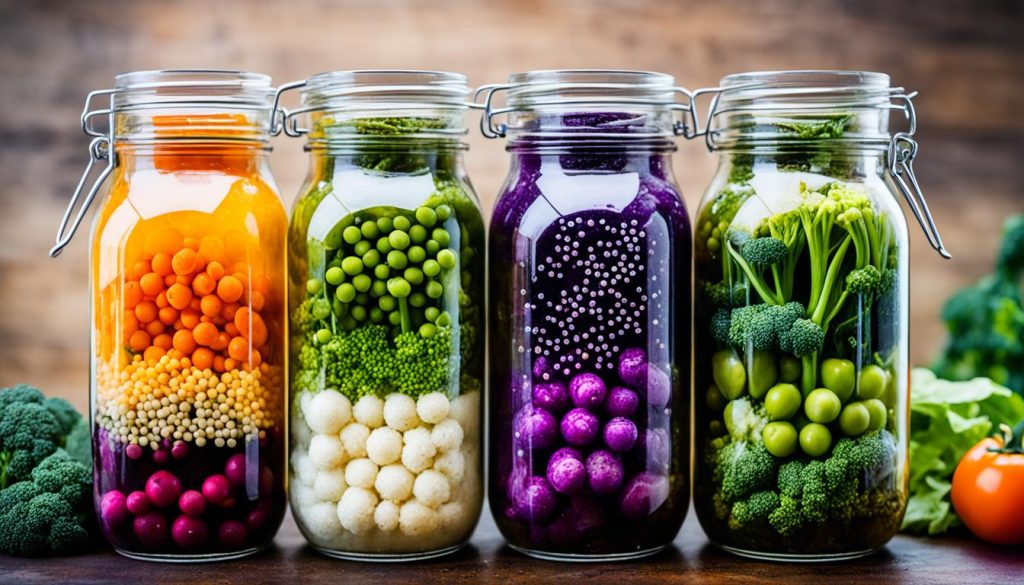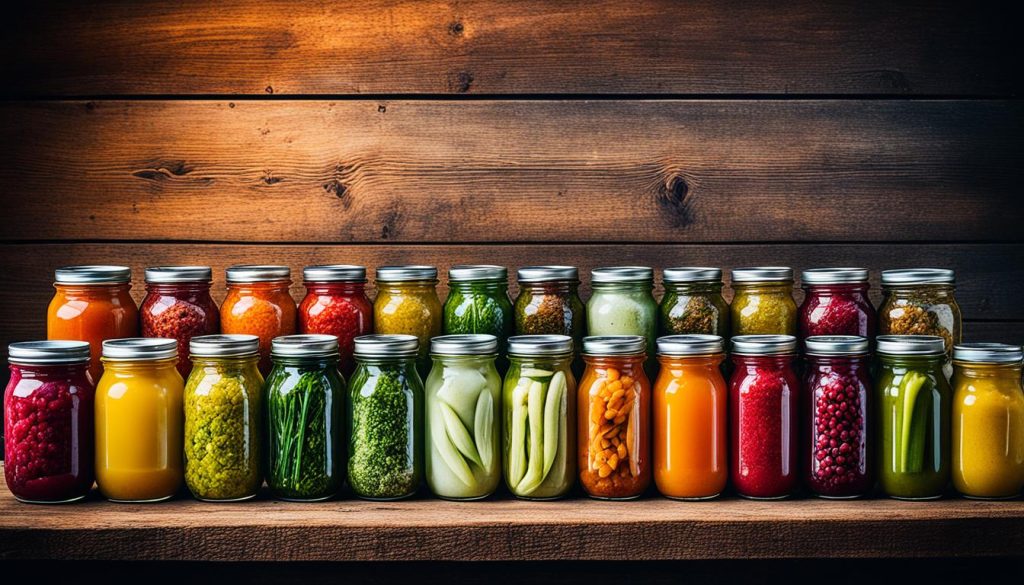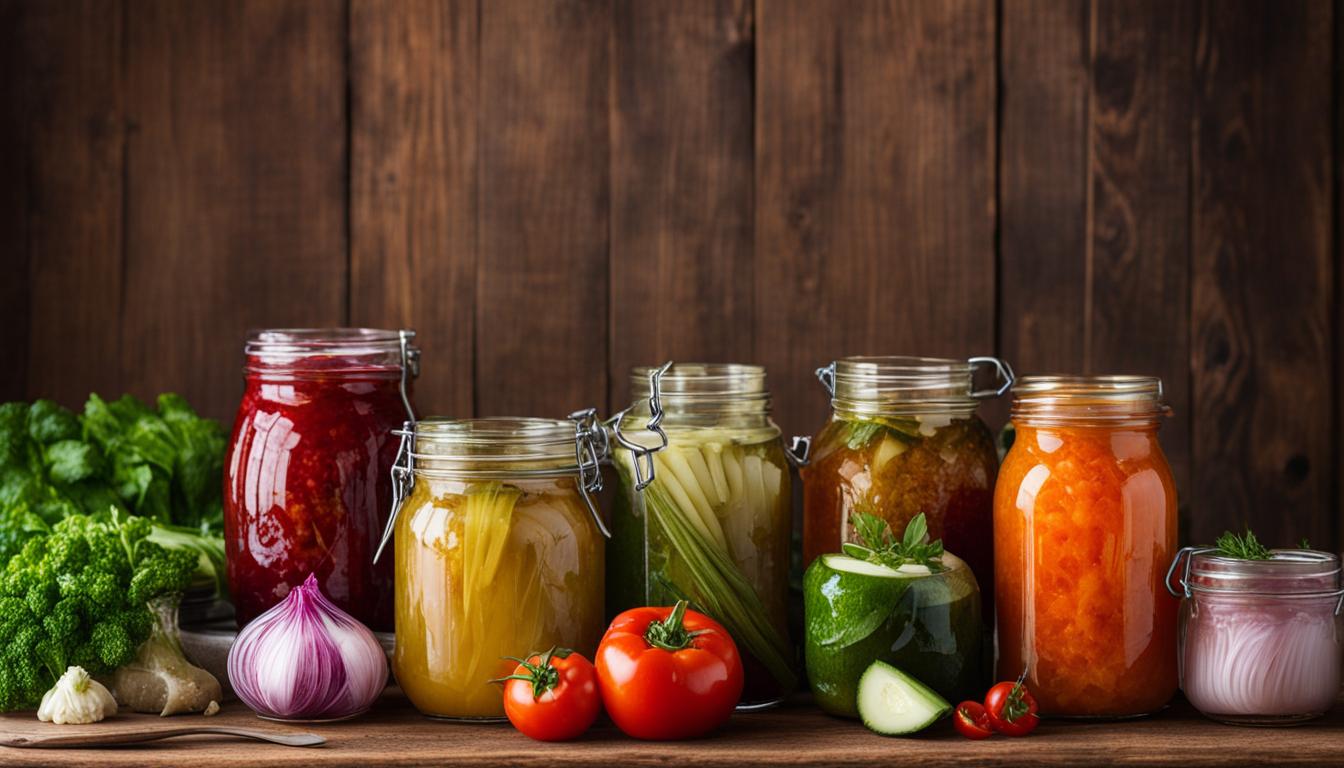As a health-conscious individual, I am always on the lookout for ways to enhance my well-being and improve my overall health. Recently, I stumbled upon an ancient culinary tradition fermented foods. These foods have been making waves in the modern wellness scene, and for good reason!
Fermented foods are not only delicious but also offer a plethora of health benefits. They promote optimal digestion, support a robust immune system, and contribute to our overall wellness. The secret lies in the natural process of fermentation, which unleashes a host of beneficial probiotics, enzymes, and vitamins that our bodies love.
Key Takeaways:
- Fermented foods are packed with health benefits for digestion, immune system, and overall wellness.
- The fermentation process creates probiotics, enzymes, and vitamins that support a healthy gut.
- Regular consumption of fermented foods can aid in digestion and improve conditions like IBS and inflammation.
- Fermented foods offer a wide range of flavors, textures, and aromas and can be incorporated into a variety of dishes.
- By embracing fermented foods, we take a step towards a healthier life and a better understanding of traditional food practices.
The Science Behind Fermentation: A Health Boon
Fermentation is a natural and age-old process that occurs when microorganisms, such as bacteria, yeast, or molds, convert carbohydrates into alcohol or acids. This transformative process not only acts as a natural preservative, extending the shelf life of foods, but it also has significant health benefits.
During fermentation, microorganisms break down complex carbohydrates, such as sugars and starches, releasing enzymes that transform them into alcohol or acids. These byproducts not only enhance the flavor, texture, and aroma of foods but also contribute to their nutritional value.
One of the key benefits of fermentation is the production of probiotics. These beneficial microorganisms created during the fermentation process populate our gut and play a vital role in maintaining gut health. Probiotics help restore the balance of friendly bacteria in the gut, promoting optimal digestion and nutrient absorption.
The probiotics found in fermented foods, such as yogurt, kefir, sauerkraut, and kimchi, aid in breaking down food, ensuring proper digestion. They also support the production of enzymes that assist in the breakdown of proteins, fats, and carbohydrates.

The benefits of fermented foods go beyond digestion. They also strengthen our immune system. The probiotics in fermented foods stimulate the production of antibodies, enhancing our body’s defense against harmful pathogens.
In addition to probiotics, fermentation also increases the availability of essential nutrients. For example, the bioavailability of certain vitamins and minerals, such as B vitamins and iron, in fermented foods is enhanced, making them more easily absorbed by our bodies.
Omega-3 fatty acids, which are known for their numerous health benefits, can also be found in some fermented foods like certain types of fish sauce and fermented soy products like tempeh and miso.
The fermentation process contributes to the development of complex flavors and aromas that make fermented foods a delightful addition to our meals. It not only transforms the taste of ingredients but also introduces unique characteristics and textures.
“Fermentation is the transformation of an ingredient. It’s like a magic trick that elevates the flavor profile and enhances the nutritional value of food.” – Jane Smith, Chef
Fermentation and Gut Health
The intricate relationship between fermented foods and gut health lies in the role of probiotics in maintaining a balanced and diverse gut microbiome. The gut microbiome is a complex ecosystem of microorganisms, including bacteria, fungi, and viruses, that reside in our digestive tract.
A healthy and diverse gut microbiome is crucial for optimal digestion, immune function, and metabolism. However, factors like stress, poor diet, and the use of antibiotics can disrupt this delicate balance, leading to digestive issues, weakened immunity, and other health problems.
The probiotics in fermented foods help restore and maintain a diverse gut microbiome. By replenishing the gut with beneficial bacteria, fermented foods support digestion, promote the absorption of nutrients, and strengthen the immune system.
Furthermore, the fermentation process increases the bioavailability of certain nutrients, making them more accessible to our bodies. This ensures that we can derive maximum nutritional benefit from our food.
Incorporating a variety of fermented foods into our diet can contribute to a healthier gut microbiome and overall well-being.
Fermentation: A Key to Optimal Digestion and Overall Health
Fermented foods are a treasure trove of health benefits, thanks to the science behind fermentation. From enhanced digestion and nutrient absorption to a stronger immune system, the probiotics, enzymes, and Omega-3 fatty acids produced through fermentation are essential for our well-being.
So, let’s embrace the wonders of fermentation and incorporate these delicious and nutritious foods into our daily diet. By doing so, we can take an important step towards better gut health, improved digestion, and overall wellness.
Fermented Foods Around the World: A Culinary Adventure
Fermented foods have taken the global culinary scene by storm, with various cultures incorporating these flavorful creations into their traditional cuisines. From spicy and tangy kimchi in Korean cuisine to the sour and crunchy sauerkraut of Germany, fermented foods offer a wide range of taste experiences.
Kimchi: In Korean cuisine, kimchi takes center stage. Made from fermented cabbage, this iconic dish boasts a perfect balance of spiciness and tang. Packed with vitamins, minerals, and probiotics, kimchi not only adds a delightful kick to meals but also offers numerous health benefits.
Sauerkraut: Germany is renowned for its sauerkraut, a beloved fermented cabbage dish. The natural sourness and distinctive texture impart depth and complexity to various German dishes. It’s also a rich source of vitamins C and K, as well as beneficial probiotics.
Yogurt and Kefir: In Middle Eastern and Eastern European countries, yogurt and kefir are staple fermented dairy products. Creamy and tangy, these probiotic-rich delights can be enjoyed on their own or incorporated into sauces, dips, and dressings. Yogurt and kefir lend a delightful twist to both sweet and savory recipes, making them versatile and beloved additions to the global culinary scene.

Across the globe, fermented foods offer a rich tapestry of flavors, textures, and aromas. They not only elevate the taste of dishes but also provide a beneficial boost to our gut health. Whether you’re exploring the fiery flavors of kimchi, savoring the tangy sauerkraut, or enjoying the creamy goodness of yogurt and kefir, fermented foods bring a unique culinary adventure to the table.
Incorporating Fermented Foods into Everyday Diet
Integrating fermented foods into your daily diet can be a versatile and enjoyable way to boost your overall well-being. These nutrient-packed foods can be incorporated into meals throughout the day, from breakfast to dinner, and even as satisfying snacks. Here are some creative ways to include fermented foods in your everyday meals:
Breakfast:
Start your day with a nutritious and probiotic-rich breakfast by combining yogurt or kefir with a variety of fruits and nuts. This delightful and refreshing combination not only provides a burst of flavor but also supports digestion and promotes a healthy gut microbiome.
Lunch and Dinner:
Add a tangy twist to your lunch and dinner by serving fermented foods as sides. Kimchi, a spicy Korean fermented cabbage dish, or sauerkraut, a sour fermented cabbage dish popular in German cuisine, are excellent options. These vibrant and flavorful additions not only enhance the taste of your meals but also provide key nutrients and probiotics that support digestion.

Main Dish Ingredients:
Explore the versatility of fermented soy products like tempeh and miso by incorporating them into your main dishes. Tempeh can be pan-fried or grilled as a flavorful protein option, while miso adds depth of flavor to soups, stews, and marinades. These fermented soy products not only elevate the taste of your meals but also provide beneficial bacteria and enzymes to support your digestive health.
Sandwiches:
Elevate your sandwich game by opting for sourdough bread. Made using a natural fermentation process, sourdough bread has a tangy flavor and a chewy texture that adds depth to your favorite sandwiches. Plus, it’s easier on the digestive system compared to conventional bread.
When incorporating fermented foods into your diet, it’s important to start slowly and listen to your body. Everyone’s tolerance and preferences may vary, so it’s best to experiment and find the fermented foods that suit your taste and digestive needs. By embracing the versatility of fermented foods, you can transform your everyday meals into wholesome and nourishing culinary experiences.
Embracing Fermented Foods for a Healthier Life
Fermented foods have transcended being just a culinary trend. They possess a myriad of health benefits that contribute to a healthier and more vibrant life. Beyond their delicious flavors and tantalizing aromas, fermented foods are a treasure trove of nutrition and probiotics that support gut health and overall well-being.
By incorporating fermented foods into our daily diets, we can experience a range of health benefits. These foods undergo the natural process of fermentation, where microorganisms bring about transformative changes that enhance both flavor and nutritional content. The result is a culinary masterpiece that nourishes our bodies and delights our senses.
When it comes to flavor, fermented foods take center stage. Through the process of fermentation, the complex flavors of everyday ingredients are elevated to new heights. Tangy, spicy, and pleasantly sour, fermented foods add depth and richness to any meal. From the fiery kimchi of Korean cuisine to the tangy sauerkraut of Germany, each culture has its own unique interpretation of fermented foods.
Not only do fermented foods tantalize our taste buds, but they also provide a wealth of nutrition. The fermentation process increases the bioavailability of nutrients, making it easier for our bodies to absorb essential vitamins and minerals. Furthermore, fermented foods are rich in probiotics, live bacteria that promote a healthy gut microbiome. These probiotics help to balance our digestive system, improve nutrient absorption, and support our immune function.
Fermented foods have stood the test of time, weaving their way into the fabric of cultural cuisines around the world. From the Middle Eastern staple of yogurt to the traditional Japanese miso soup, fermentation has long been cherished as a valuable culinary tradition. As we embrace fermented foods, we not only honor these time-honored traditions but also unlock the immense health benefits they offer.
The Flavors and Health Benefits of Fermented Foods
| Fermented Food | Flavor Profile | Health Benefits |
|---|---|---|
| Kimchi | Spicy, Tangy | Rich in vitamins A, C, and K, supports digestion |
| Sauerkraut | Sour, Savory | High in immune-boosting antioxidants, aids in digestion |
| Yogurt | Tangy, Creamy | Provides probiotics, strengthens gut health |
| Miso | Savory, Umami | Rich in antioxidants, aids in digestion |
Integrating fermented foods into our daily diets is more than just a culinary choice; it is a profound step towards better health and well-being. By nourishing our bodies with these nutrition-packed foods, we empower ourselves to live our best lives. Let us embrace the enchanting world of fermented foods, savoring their flavors and reaping the numerous health benefits they bring.
The Gut Microbiome and Fermented Foods
A healthy and diverse gut microbiome is crucial for optimal digestion, nutrient absorption, and immune function. The gut microbiome consists of trillions of microorganisms, including bacteria, viruses, and fungi, that live in our digestive tract. When the balance of these microorganisms is disrupted, it can lead to digestive issues, weakened immune function, and even metabolic disorders.
Fermented foods play a significant role in promoting a balanced and diverse gut microbiome. These foods undergo a fermentation process, where natural bacteria convert sugars and starches into beneficial compounds like probiotics.
“The consumption of fermented foods can positively influence the gut microbiota and provide a wide range of health benefits.”
Probiotics are live microorganisms that, when consumed, can confer health benefits to the host. They help establish a healthy balance of bacteria in the gut, improving overall digestive function and nutrient absorption. The presence of probiotics in fermented foods enhances the diversity of the gut microbiome and supports a healthy immune system.
Furthermore, the fermentation process breaks down complex carbohydrates and proteins, making them more easily digestible. This is particularly beneficial for individuals with digestive issues such as lactose intolerance or gluten sensitivity.
Fermented Foods and Immune Function
One of the key functions of the gut microbiome is its role in immune function. The gut is home to a large proportion of immune cells that help protect the body against harmful pathogens. The presence of a diverse and balanced gut microbiome is essential for a robust immune response.
Research has shown that the consumption of fermented foods can positively influence the gut microbiota and provide a wide range of health benefits, including improved immune function. Probiotics in fermented foods stimulate the production of immune cells and promote the release of anti-inflammatory compounds, enhancing the body’s defense against infections and diseases.
The Impact on Metabolism
In addition to digestion and immune function, the gut microbiome also plays a crucial role in metabolism. Recent studies have suggested a link between gut microbiota composition and metabolic disorders such as obesity and diabetes.
The consumption of fermented foods, rich in probiotics, has been associated with improved metabolic health. Probiotics aid in the breakdown and absorption of nutrients, help regulate appetite, and modulate the body’s energy balance. This can have a positive impact on weight management and metabolic function.
| Fermented Foods | Probiotic Strains | Health Benefits |
|---|---|---|
| Yogurt | Lactobacillus acidophilus, Bifidobacterium | Improves digestion, supports immune function |
| Sauerkraut | Lactobacillus plantarum, Leuconostoc mesenteroides | Aids in nutrient absorption, promotes gut health |
| Kefir | Lactobacillus kefiri, Bifidobacterium lactis | Enhances digestive function, supports a healthy gut microbiome |
| Kimchi | Lactobacillus brevis, Lactobacillus plantarum | Reduces inflammation, boosts immune system |
The table above showcases some popular fermented foods and the probiotic strains they contain, along with their respective health benefits.
Conclusion
Fermented foods are not just a passing trend; they offer a wealth of benefits for our gut health, overall well-being, and culinary experiences. These foods are a testament to the traditional practices of our ancestors, providing us with not only delicious flavors but also essential nutrition.
By incorporating fermented foods into our daily diet, we are taking significant steps towards better health. These foods support our gut health by promoting the growth of beneficial bacteria, improving digestion, and enhancing nutrient absorption. The probiotics found in fermented foods also contribute to a strong immune system, helping us boost our body’s defenses.
Moreover, fermented foods offer a wide range of culinary experiences. From tangy kimchi to creamy yogurt and hearty sauerkraut, there is a fermented delight to suit every palate. They add depth and complexity to both simple and elaborate dishes, elevating the overall enjoyment of our meals.
As we explore the world of fermented foods, we are reminded that the best foods are often those that have withstood the test of time. From traditional dishes handed down through generations to modern creations inspired by global cuisines, fermented foods truly offer a journey that combines nutrition, flavor, and cultural heritage.


